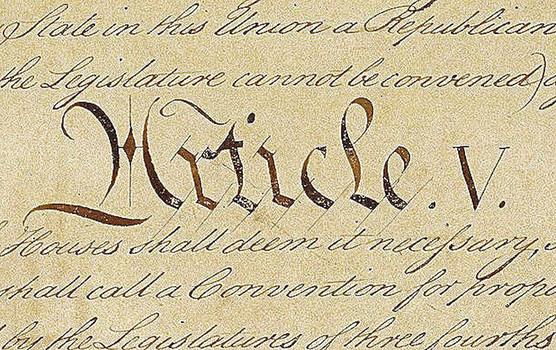Article V empowers states to limit the federal government and is the megaphone for the peoples’ voice. This is part two of a how-to manual on limiting the federal government, skipping congress, and going straight to the Constitution.
Part I – Article V – Empowering States to Limit the Federal Government
We want to thank Nicole Fortune for this Op-Ed. If you have an Op-Ed or LTE
you want us to consider, please submit it to skip@ or steve@granitegrok.com.
The greatest danger of Article V is that states can individually opt-out of its right of checks and balances on the federal government; thereby sacrificing the voice of its people and giving a greater say to those states that have not opted out. Essentially, a state that opts out of the convention relegates itself to the decisions of other states.
Focusing solely on a convention of the states, Article V states in pertinent part that, “… on the application of the legislatures of two-thirds of the several states, shall call a convention for proposing amendments, which, in either case, shall be valid to all intents and purposes, as part of this Constitution, when ratified by the legislatures of three-fourths of the several states, or by conventions in three fourths thereof, … and that no state, without its consent, shall be deprived of its equal suffrage in the Senate.”
Clearly, a state can be denied equal suffrage (its right to checks and balances on the federal government) with its consent. A state consents by not sending delegates to a called convention, in other words, by not convening. It essentially opts out of having any discussion about, and more importantly foregoes its vote on, the proposed amendments. This is exactly what Rhode Island did in the first convention of the states. The remaining twelve states sent delegates. Article V requires either three-fourths of the several states or three-fourths of those convening to ratify. Three-fourths of the several (thirteen) states would have required ten states to ratify, but three-fourths of the convening (twelve) states only required nine to ratify. New Hampshire was the ninth state to ratify, making the Constitution the law of the land.
Article VII essentially articulates the math above. It applied the convention language in Article V to the practicality of the convention with Rhode Island’s absence. Article VII states, “The Ratification of the Conventions of nine States, shall be sufficient for the Establishment of this Constitution between the States so ratifying the Same.” (Emphasis added.) While Rhode Island did subsequently ratify the Constitution and become a state of the newly formed country, because it did not send delegates, the voice of its people was not represented in creating the Bill of Rights or any of the Articles in the Constitution. Don’t be Rhode Island!
The same would happen to any state that chose to opt-out of a convention today. The United States being comprised of fifty states requires thirty-four states to call a convention. Once the convention is called, all fifty states may send delegates, but if, by example, only thirty states convene and ratification is by three-fourths of those convening, twenty-three states could amend the Constitution, binding all fifty states. Again, don’t be Rhode Island!
Given the above, why would any state opt-out? That will be addressed in the next article, “The Great Divide on Article V.”
